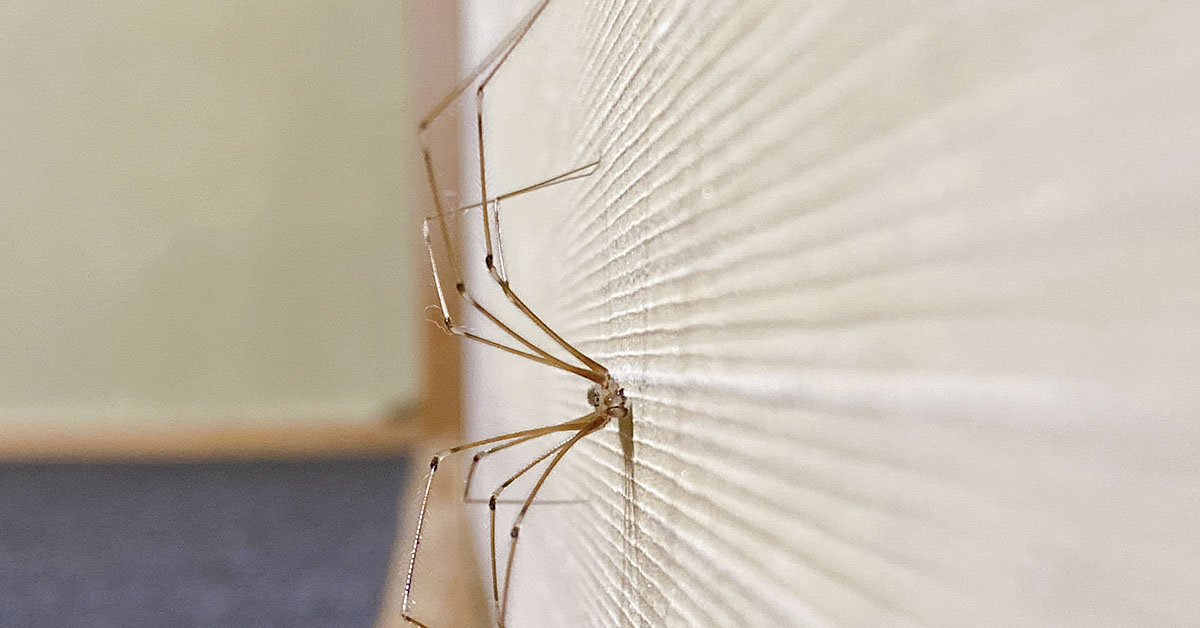As the impending “spider season” approaches, homeowners can anticipate the arrival of larger-than-usual arachnid guests in their abodes. October is renowned as the time when spiders engage in their mating season. According to knowledgeable experts, these eight-legged creatures may seek refuge in people’s homes to escape the cooler weather while searching for warmth and moisture. Frequently, their chosen domains within residences are the kitchens and bathrooms. While no one wishes harm upon these creepy crawlies, most individuals would rather not share their living spaces with them. The good news is that a straightforward and cost-effective solution may be at hand.
Enter a clever hack to rid your home of spiders that costs pennies and has the added bonus of imparting a fresh scent to your home
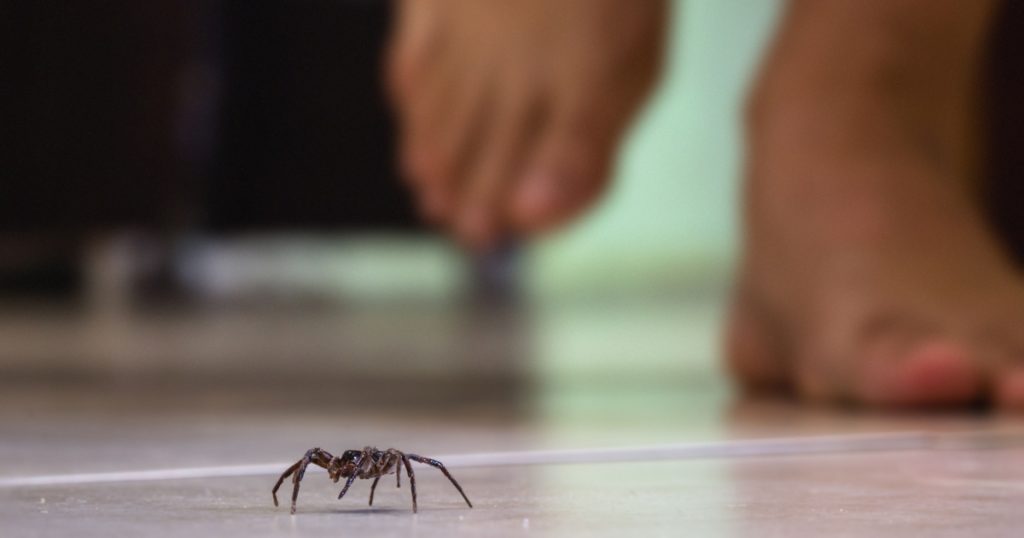
Mike Norton from The Mirror explained: “Like all species, spiders need water and moisture to survive. From sinks and dishwashers to the warmth given off by appliances, it’s the kitchen and bathroom that create the perfect moist environment to draw them in. Although they are mostly harmless, we don’t want crawlers contaminating our food or creeping up on us in the bathroom.” Norton’s recommendation entails the application of lemon peel to various areas within the home, including windowsills, skirting boards, and any other potential spider hideouts.
Read More: Why You Should Never Kill a Spider in Your Home
He explained that the citrus aroma will “deter them from settling” while simultaneously imparting a delightful, fresh fragrance to the household
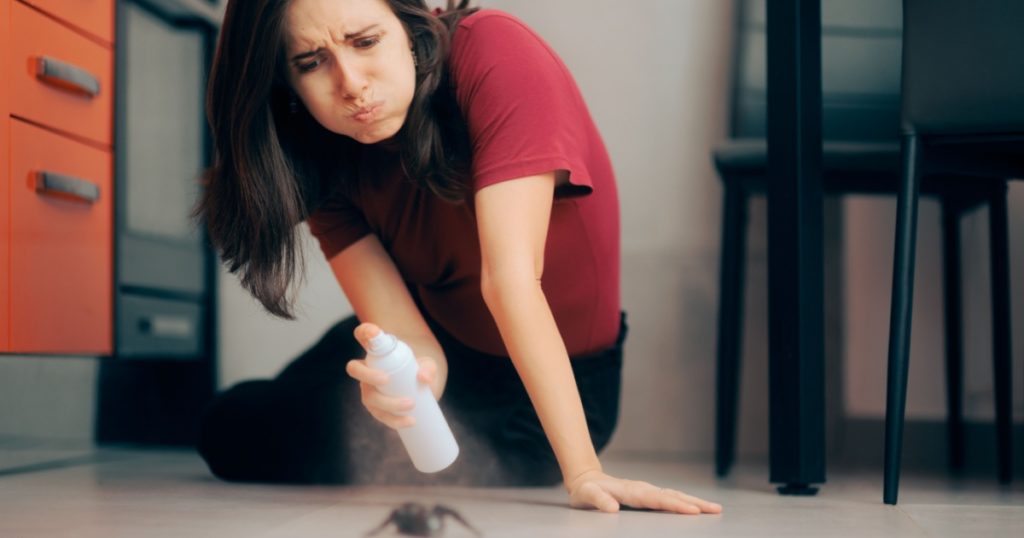
The cost of a single lemon should be approximately 17.5 cents. Furthermore, Norton emphasized the wisdom of prevention over intervention and offered guidance on keeping spiders from entering your home in the first place. “Start by sealing any cracks or openings around your windows and doors with caulk, weather stripping or sealant to reduce the chance of an initial invasion,” he said. “With the cold weather approaching, getting this done now has the added benefit of retaining heat better in your home and saving energy through reduced central heating use and temperatures.” He continued.
Here are a few more options to try when you want to rid your home of spiders
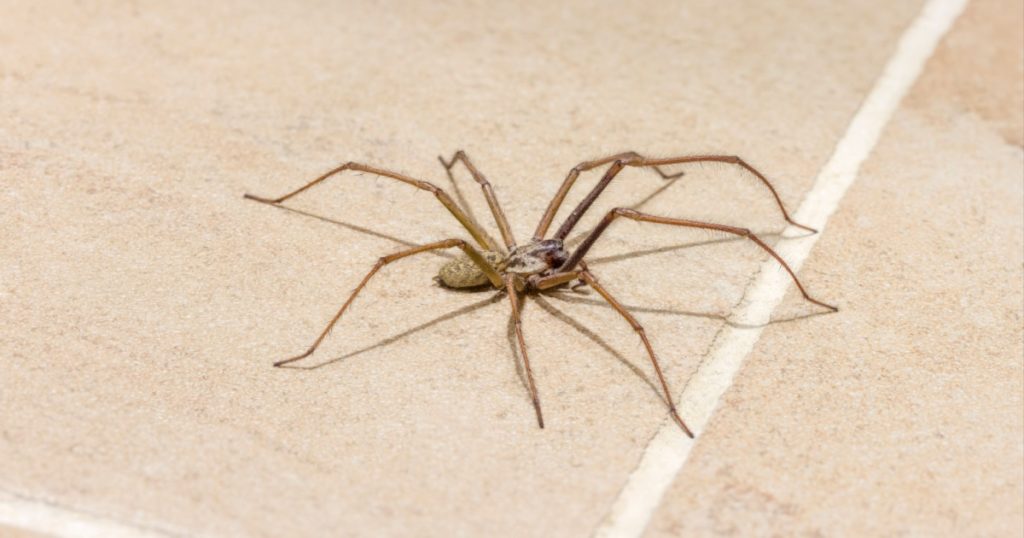
The scent of the essential oils will help deter spiders from entering your home, and the spray can also be used as a general-purpose cleaner to keep your house smelling pleasant and clean.
Ingredients:

- 1 cup of water
- 1/4 cup of white vinegar
- 10-15 drops of essential oil (such as peppermint, citrus, or tea tree oil)
Instructions:

- Mix the water and white vinegar in a spray bottle. This solution is the base for your anti-spider spray.
- Add 10-15 drops of your chosen essential oil to the mixture. Essential oils like peppermint, citrus, or tea tree oil are known for their spider-repelling properties and can also leave your home smelling fresh.
- Shake the spray bottle well to ensure the ingredients are thoroughly mixed.
- Spray this mixture along windowsills, doorways, cracks, and any other areas where spiders may enter your home frequently.
- Reapply the spray regularly, especially after cleaning or when you notice spider activity.
Read More: Spray this Simple 2-Ingredient Mixture & You Will Never See Spiders or Insects in Your Home
Removal of Spiders
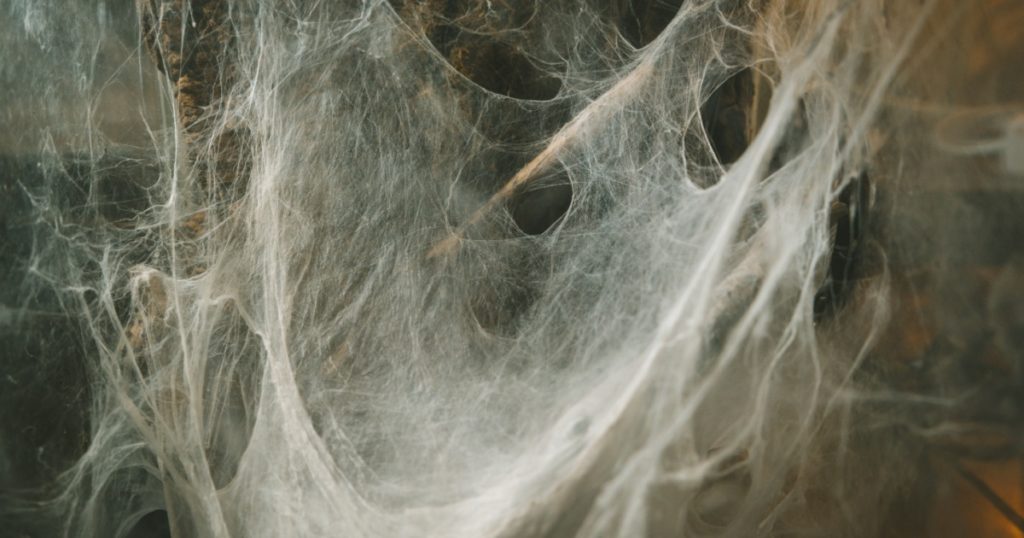
Remember to handle spiders gently to avoid harming them, and it’s a humane way to relocate them outside your home. If you want to safely remove a spider from your home using a tumbler or glass, here are step-by-step instructions:
Materials Needed:
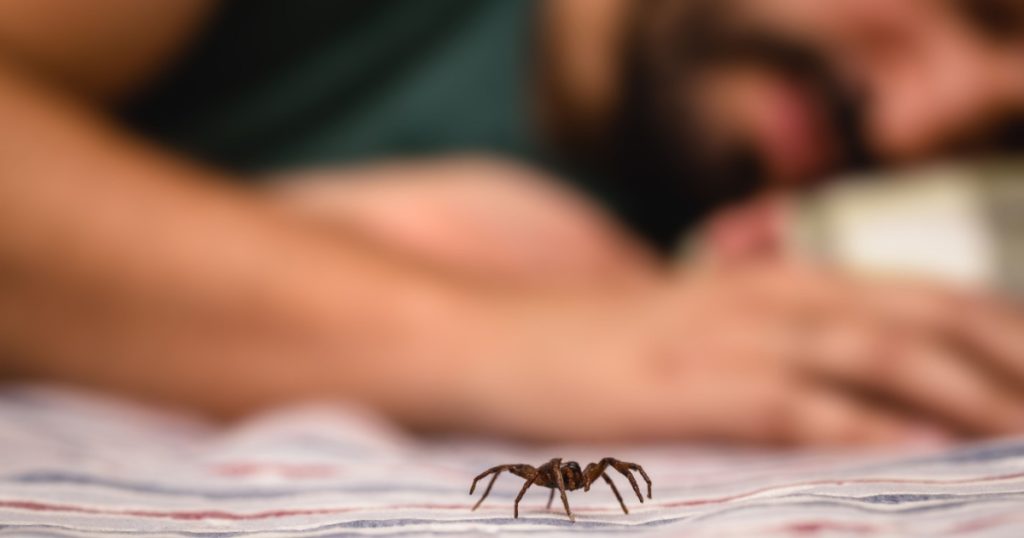
- A clear glass or tumbler
- A stiff piece of paper or cardboard
- Gloves (optional, for those uncomfortable handling spiders)
Instructions:

- Prepare Your Materials: Have your glass or tumbler, stiff paper or cardboard, and gloves (if desired) ready.
- Approach the Spider: Approach the spider slowly and calmly. It’s essential not to startle it, as this can make it more difficult to catch.
- Place the Glass: Carefully place the glass or tumbler over the spider. Position it so that the spider is trapped beneath the glass.
- Slide the Paper or Cardboard: Slide the stiff piece of paper or cardboard carefully under the glass, making sure to keep the spider trapped inside.
- Lift the Spider: Gently lift the glass, which should now have the spider trapped on the piece of paper or cardboard.
- Move Outside: Carefully carry the glass and the spider outside.
- Release the Spider: Once you’re outdoors, gently tilt the glass and slide the cardboard or paper to allow the spider to crawl out. Make sure to release it far enough away from your home so that it doesn’t return immediately.
- Wash and Disinfect: After you’ve safely released the spider, wash the glass or tumbler and the cardboard or paper with soap and water or disinfect them to ensure they are clean for future use
Preventing Spiders from Coming Inside
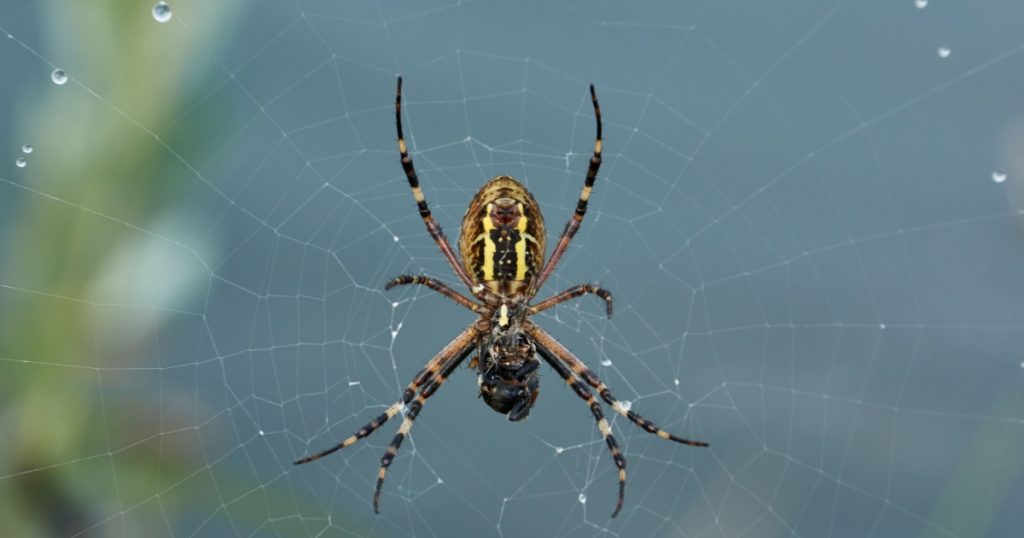
Sealing these gaps will keep spiders out and improve your home’s energy efficiency by preventing drafts and reducing heating or cooling loss. Sealing cracks and openings around windows and doors is an effective way to prevent spiders from entering your home. Here are the steps to follow:
Materials Needed:
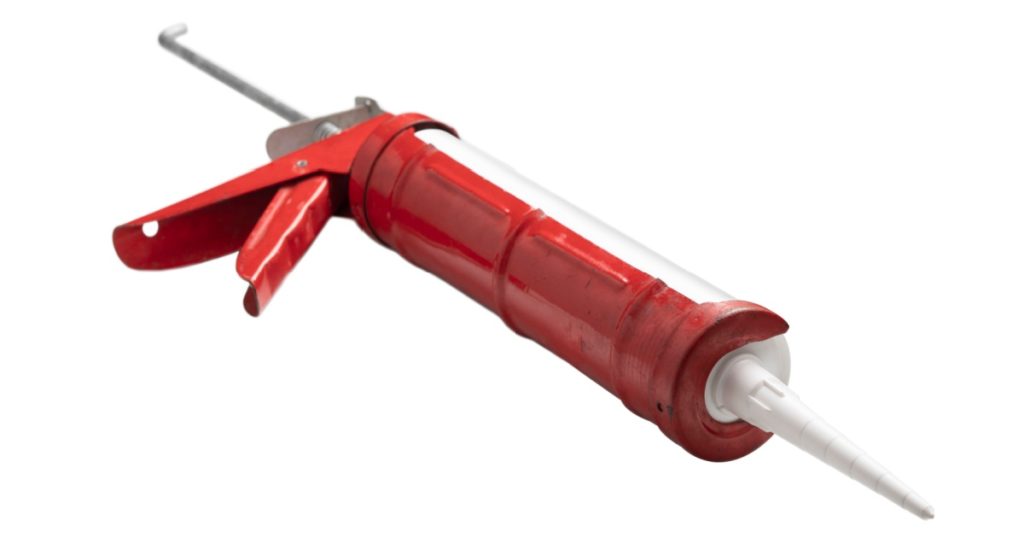
- Caulk gun
- Caulk (choose a suitable type for your specific needs, such as silicone or weatherstripping caulk)
- Putty knife or caulking tool
- Clean, dry cloth
- Screwdriver (for removing old caulk or weatherstripping, if necessary)
Instructions:

- Inspect for Cracks and Openings: Carefully inspect the areas around your windows and doors for any cracks, gaps, or openings where spiders could enter. Check both the interior and exterior of your home.
- Remove Old Caulk or Weatherstripping (if needed): If you find old or damaged caulk or weatherstripping, use a screwdriver or a caulking tool to remove it. Ensure that the surfaces are clean and dry before proceeding.
- Choose the Right Caulk: Select an appropriate caulk for the job. Silicone caulk is a common choice for sealing gaps around windows and doors due to its durability and flexibility. Weatherstripping caulk is also an option for sealing small gaps.
- Load the Caulk Gun: Load the caulk gun with the chosen caulk cartridge, following the manufacturer’s instructions. Cut the tip of the cartridge at an angle to create a small opening.
- Apply the Caulk: Starting at one end of the crack or gap, slowly squeeze the caulk gun’s trigger to apply a consistent caulk of caulk along the entire length. Use a steady and even hand to ensure a smooth application.
- Smooth the Caulk: After applying the caulk, use a putty knife or caulking tool to smooth and flatten the caulk line. This not only seals the gap effectively but also provides a neater appearance.
- Wipe Away Excess: While the caulk is still wet, use a clean, dry cloth to wipe away any excess caulk, leaving a clean finish.
- Repeat for All Openings: Repeat the caulking process for all cracks and openings around windows and doors inside and outside your home.
- Let it Dry: Allow the caulk to dry and cure per the manufacturer’s instructions. This typically takes several hours to a day.
- Check for Leaks: Once the caulk is dry, check for any missed gaps or leaks. If you find any, repeat the caulking process as needed.
Read More: Woman Urges Shoppers To Wash New Clothes After Making Terrifying Discovery
Keeping Clean

Maintaining clean and tidy rooms is not only essential for a comfortable and pleasant living environment but also plays a role in deterring pests like spiders. By maintaining cleanliness and orderliness in your rooms, you not only create a less hospitable environment for spiders but also enhance the overall comfort and hygiene of your living space.
Here are some tips for keeping your rooms clean and tidy

- Regular Cleaning Routine: Establish a regular cleaning schedule that includes tasks such as dusting, vacuuming, sweeping, and mopping. Pay close attention to corners, baseboards, and areas where spiders may hide.
- Declutter: Keep your rooms free of unnecessary clutter. Clutter provides hiding spots for spiders and makes cleaning more challenging.
- Store Food Properly: Store food in airtight containers to prevent crumbs and spills that can attract insects, which, in turn, may attract spiders.
- Clean Dishes Promptly: Don’t leave dirty dishes in the sink for an extended period. Wash them promptly to prevent food residue that can attract pests.
- Regularly Empty Trash Bins: Empty trash bins regularly, and ensure that they have tight-fitting lids to keep pests away.
- Seal Cracks and Gaps: As mentioned earlier, seal any cracks and gaps around windows, doors, and baseboards to prevent spiders from entering your home.
- Launder Bedding and Curtains: Wash bedding, curtains, and other fabric items regularly to remove dust and allergens that may attract spiders.
- Pet Care: If you have pets, clean their living areas and vacuum pet hair regularly, as pet hair can attract spiders and other pests.
- Remove Cobwebs: Periodically check for and remove cobwebs in corners, ceilings, and other hidden areas. This prevents spiders from establishing nests and keeps your rooms looking cleaner.
- Proper Storage: Store items like firewood, shoes, and outdoor gear away from the interior of your home, as spiders can hitch a ride on these items.
- Ventilate and Control Humidity: Properly ventilate your rooms to reduce humidity levels, as high humidity can attract certain types of spiders. Use a dehumidifier if necessary.
- Inspect and Shake Out Clothing: Before putting on clothes that have been sitting in closets or drawers for a while, give them a good shake to dislodge any potential hiding spiders.
Citronella air fresheners and candles are effective at repelling not only spiders but also other insects like mosquitoes and flies

Citronella oil, derived from the leaves of the citronella plant, has a strong, pleasant aroma that many insects find unpleasant, making it a natural insect repellent. Citronella-based products provide a natural and pleasant way to repel spiders and insects, and they can create a more enjoyable and pest-free environment, whether you’re indoors or outdoors. Remember that while citronella can be effective, it may not completely eliminate all insects, so additional pest control measures may be necessary in areas with a high pest population. Here’s how to use citronella air fresheners and candles to keep spiders and other insects at bay:
Citronella Candles:
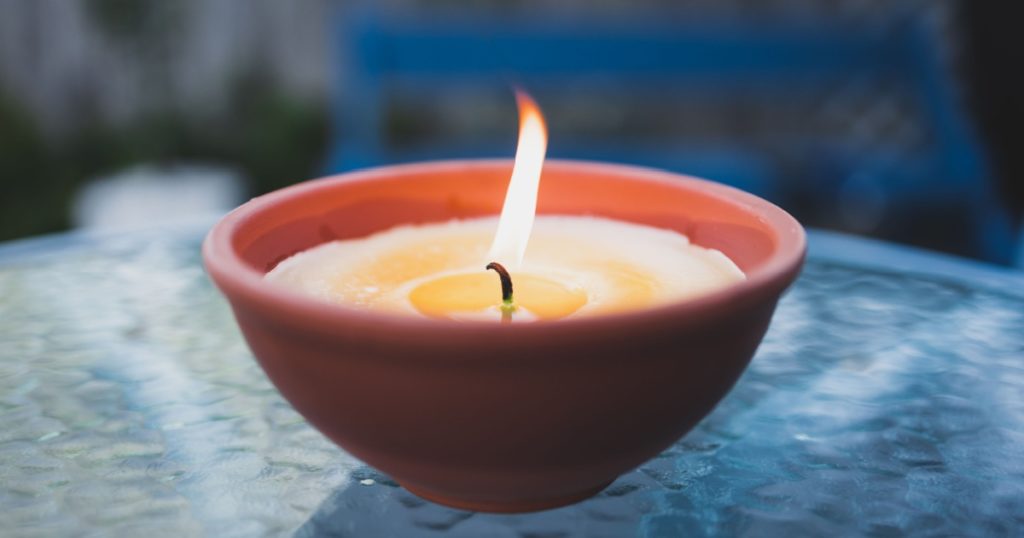
- Select Citronella Candles: Purchase Citronella candles from a store or online. These candles are readily available in various sizes and styles.
- Place Candles Strategically: Position the citronella candles in areas where you want to deter spiders and other insects. Common locations include outdoor patios, decks, and near windows and doorways.
- Light the Candles: Light the citronella candles when you’re spending time in the designated area or when you want to keep insects away. Citronella candles work best in areas with minimal wind, as the scent can disperse quickly in strong breezes.
- Maintain a Safe Distance: Ensure that the candles are placed safely away from flammable materials and out of the reach of children and pets. Follow the manufacturer’s instructions for candle safety.
- Monitor and Replace: Keep an eye on the candles and replace them as needed when they burn down. Citronella candles typically provide a few hours of protection per candle.
Citronella Air Fresheners:
- Choose Citronella Air Fresheners: You can also find citronella air fresheners in various forms, such as sprays, diffusers, or hanging air fresheners.
- Spray or Place Them: Depending on the air freshener type, spray it in the area you wish to protect or hang it in a convenient location. These are suitable for indoor use.
- Follow Instructions: Always follow the manufacturer’s instructions for your specific citronella air freshener product.
Read More: 7 Ways To Keep Ants, Fleas, And Other Pests Out Of Your Home
Using Plants

Adding spider-repelling plants to your indoor and outdoor spaces is another natural and effective way to deter spiders from taking up residence in your home These plants emit scents that spiders find unpleasant, helping to keep them at bay. Remember that while these plants can help deter spiders, their effectiveness may vary, and it’s best to use them in conjunction with other preventive measures, such as sealing cracks and maintaining cleanliness. Additionally, some of these plants may be toxic to pets if ingested, so consider their placement carefully if you have animals in your home or garden.
Here are some spider-repelling plants you can consider incorporating into your living areas:

- 1. Peppermint (Mentha x piperita): Peppermint plants have a strong, refreshing scent that spiders dislike. Grow peppermint indoors in pots or plant it in outdoor garden beds.
- 2. Lavender (Lavandula angustifolia): Lavender has a pleasant aroma that humans love but spiders dislike. Plant lavender in your garden or keep potted lavender indoors.
- 3. Lemon Balm (Melissa officinalis): Lemon balm, with its lemony fragrance, can deter spiders. Grow lemon balm in containers or garden beds.
- 4. Eucalyptus (Eucalyptus spp.): Eucalyptus plants emit a strong aroma that spiders find unappealing. Place potted eucalyptus indoors near windows and doorways.
- 5. Citronella (Cymbopogon nardus): Citronella plants are well-known for their ability to repel mosquitoes and also have a spider-deterrent effect. Grow citronella plants in pots or plant them in outdoor areas.
- 6. Chrysanthemum (Chrysanthemum spp.): Chrysanthemums contain a natural insect-repelling compound called pyrethrum, which can deter spiders and other insects. Plant chrysanthemums in your garden or keep potted varieties indoors.
- 7. Basil (Ocimum basilicum): Basil not only adds flavor to your dishes but also has a scent that spiders dislike. Grow basil in pots on your windowsill or in your garden.
- 8. Rosemary (Rosmarinus officinalis): Rosemary’s aromatic fragrance can help keep spiders away. Plant rosemary in pots or in your garden.
- 9. Mint (Mentha spp.): Various mint varieties, such as spearmint and pennyroyal, can be effective in repelling spiders. Plant mint in containers to prevent it from spreading too vigorously.
- 10. Marigold (Tagetes spp.): Marigolds have a strong scent that can deter spiders and other insects. – Plant marigolds in your garden or use them as potted plants.
Read More: Mother Gets Mixed Reaction Over Not Allowing Her 7-Year-Old Son To Go To Men’s Toilet By Himself
Sources
- “The 14p household ingredient that could banish spiders from your home.” Chronicle Live. Ryan Fahey & Barbara Hodgson. September 9, 2023
- “Seven ways to get spiders out of your house – and expert advice on whether they actually work.” Breaking News. Lisa Salmon. September 14, 2021
